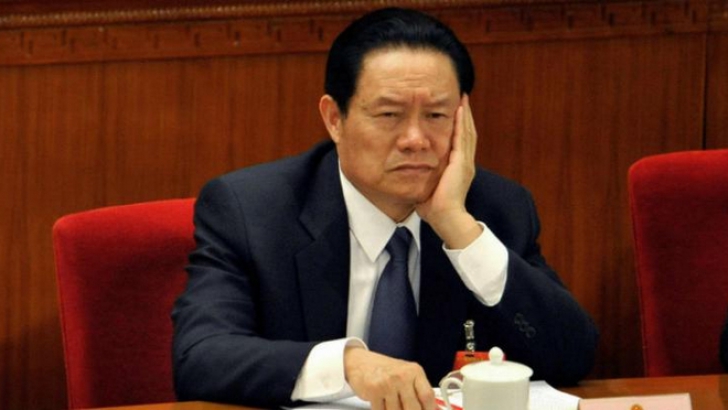Fostul şef al securităţii chineze, Zhou Yongkang, este urmărit pentru mită, abz de putere şi trădarea unor secrete de stat. Zhou (73 de ani) s-a retras din temuta funcţie în 2012, a fost un şef extrem de temut, unul dintre aceia care au făcut ordine când a fost nevoie la vârful Partidului Comunist Chinez, scrie Washington Post.
Este încălcată o regulă tacită. Până acum membrii comitetului central al partidului nu erau anchetaţi nici după retragere. Însă au venit acuzaţii de luare de mită uriaşă de către Zhou care avea influenţă şi în industria petrolului şi în alte zone industriale. Procurorul a justificat punerea sub acuzare prin dimensiunea mitei şi prin efectele grave asupra societăţii.
Zhou a fost prezentat încă de anul trecut, cînd a fost exclus din partid, ca o piesă centrală în lupta anticorupţie demarată de preşedintele XI. Experţii o prezintă însă ca pe victoria unei facţiuni, după ce mai multe grupuri de influenţă din partid au negociat puterea intens în culise.
Aliaţii lui Zhou era celebrul Bo Xilai, liderul condamnat în 2013 la închisoare pe viaţă, şi generalul Xu Caihou, care a murit de cancer în arest. Faptul că nu l-au sprijinit pe Xi în candidatura lui pentru funcţia de secretar general pare să le fi fost fatal.
Zhou va fi cel politicianul cel mai înalt în grad care va apărea în faţa unui tribunal după apariţia soţiei lui Mao în 1981. Istoricul Zhang Lifan a declarat că anunţul începerii urmăririi este un avertisment dur pentru toţi oponenţii preşedintelui Xi Jinping.
BEIJING — China charged former security chief Zhou Yongkang on Friday with taking bribes, abusing his power and disclosing state secrets, paving the way for one of the most significant political trials in the country in decades and underlining President Xi Jinping’s dramatic consolidation of power.
Zhou, 73, presided over the nation’s huge and extremely powerful state security apparatus, including police and intelligence agencies, until his retirement in 2012, enforcing Communist Party control through a massive network of surveillance and repression. He was hated by many, and feared by almost everyone.
He also controlled much of the country’s huge oil industry, rising to power through its ranks, and was a key member of the party’s apex body, the Politburo Standing Committee. His downfall breaks an unwritten rule, in place for decades, that made members of the Standing Committee immune from prosecution even after retirement.
The indictment accused Zhou of illegally accepting “huge” bribes, “taking advantage of his position to seek benefits for others,” abusing his power, intentionally disclosing state secrets and “causing heavy losses to public property, the state and the people,” China’s top prosecutor said in a statement on the office’s Web site.
“The impact on society is vile; the circumstances are especially serious,” the indictment said.
Zhou was arrested and expelled from the party last year, and the formal charges came as no surprise. The government has presented his arrest as a centerpiece of Xi’s determination to root out corruption, and proof that even senior party members are not above the law.
In reality, experts said, given that corruption is widespread throughout the party, Zhou’s downfall is more likely to represent Xi’s victory over a rival faction that had attempted to block his rise. The charges had been rumored long before they were made public, and Zhou's downfall came only after intense behind-the-scenes negotiations between powerful Communist Party leaders, experts said.
Zhou's allies included Bo Xilai, the charismatic former party chief of Chongqing, who was sentenced to life imprisonment for corruption in September 2013, and Gen. Xu Caihou, who died of bladder cancer while under arrest on similar charges last month, said Willy Wo-Lap Lam, a senior fellow at the Jamestown Foundation based in Hong Kong.
“They did not believe that Xi Jinping was qualified to be general secretary,” said Lam, referring to the top position in the Chinese Communist Party. “The army and armed police were also involved. Rumor has it that they planned a political coup. I don't see evidence to prove this, but they did form an organization inside the party to go against Xi Jinping.”
Last month, the Supreme People’s Court said in an annual report that Zhou, Bo and others had “trampled laws” and “engaged in political activities” that were never authorized by the top leadership. The report said they had caused severe harm to the party and the judicial system.
The charges against Zhou were filed in a court in Tianjin, a city around 80 miles by road southeast of Beijing, where the trial will be held. No date has been set. State media promised last month that the trial would be “open,” although diplomats and independent journalists are almost certain to be barred and official reports carefully censored.
The charges relating to leaking state secrets are also very unlikely to be publicly aired: as head of domestic intelligence, Zhou would have had access to the entire nation's secrets, including those of powerful political rivals.
He will be the highest politician to stand trial since the 1981 show trial of Mao Zedong’s wife, Jiang Qing, and other members of the “Gang of Four.” They were convicted of leading the purges, persecution and chaos of China’s 1966-76 Cultural Revolution.
Zhang Lifan, a historian and critic of the Communist Party, said the fact that the news was released on a weekday, rather than at midnight or on a weekend, was a statement in itself, designed to shock Xi’s opponents and warn anyone who “makes a reckless move, that you could be next.”
But Zhang said the power struggle at the top of the party was far from over.
Liu Liu contributed to this report.

Trending on Social Media










